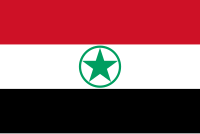Democratic Revolutionary Front for the Liberation of Arabistan
This article needs additional citations for verification. (May 2020) |
| Democratic Revolutionary Front for the Liberation of Arabistan | |
|---|---|
 Flag used by the group | |
| Leader | Oan Ali Mohammed † |
| Dates of operation | 1979–1980 |
| Motives | Secession from Iran, formation of an Arab state of Arabistan |
| Active regions | Khuzestan, Iran |
| Ideology | Arab nationalism |
| Notable attacks | 1979 Khuzestan uprising, 1980 Iranian embassy siege |
| Status | Sided with Iraq during the Iran–Iraq War,[1][2] later morphed into the Arab Struggle Movement for the Liberation of Ahwaz (ASMLA)[3] |
The Democratic Revolutionary Front for the Liberation of Arabistan (DRFLA) (Template:Lang-ar, al-Jabha al-dīmuqrāṭiyya al-thawriyya li-taḥrīr ‘Arabistān) was an Iranian Arab militant group founded in 1979, most famous for the 1980 Iranian Embassy siege in London, England. It was led by Arab nationalist Oan Ali Mohammed, who was killed during the siege by British SAS operatives.
History
The DRFLA claims to have taken part in the 1979 Iranian Revolution, assisting Ayatollah Ruhollah Khomeini's uprising which overthrew the Shah, Mohammad Reza Pahlavi, and subsequently established an Islamic republic, effectively ending the millennia-old inherited Persian monarchies. However, shortly after the revolution, the DRFLA began an insurgency in Khuzestan. In 1980, DRFLA militants besieged the Iranian embassy in London and took 26 hostages, threatening to execute them unless the United Kingdom secured the release of 91 Arabs incarcerated in various Iranian prisons. They also demanded that all the Arab states' diplomatic ambassadors in London mediate on their behalf with the British government. The British Prime Minister Margaret Thatcher responded by authorizing Operation Nimrod to free the hostages. After negotiations with the Arab militants became bogged down, the Special Air Service stormed the building and killed the DRFLA leader, Oan Ali Mohammed, along with all but one of the other militants while suffering no fatalities themselves. After this incident, the DRFLA did not take part in any major militant attacks and remained largely inactive until the Iraqi invasion of Iran, where they sided with Iraq as open belligerents in the ensuing Iran–Iraq War. The group has been defunct since 1980, with its spiritual successor being the currently-active Arab Struggle Movement for the Liberation of Ahvaz (ASMLA).
References
- ^ Murray, Williamson; Woods, Kevin M. (2014-09-04). The Iran-Iraq War: A Military and Strategic History. ISBN 9781107062290.
- ^ Johnson, Rob (2010-11-24). The Iran-Iraq War. ISBN 9781137267788.
- ^ "Refworld | Iraqi Militants Encourage People of Khuzestan to Launch Jihad against Iran".
- Chant, Chris: Special Forces. ISBN 978-1-4454-7214-0.
- Arab nationalism in Iran
- Arab nationalist militant groups
- Arab political parties in Iran
- Iran–Iraq War
- Khuzestan conflict
- Militant opposition to the Islamic Republic of Iran
- National liberation armies
- Organizations based in Asia designated as terrorist
- Organisations designated as terrorist by Iran
- Organisations designated as terrorist by the United Kingdom
- Organisations of the Iranian Revolution
- Terrorism in Iran
